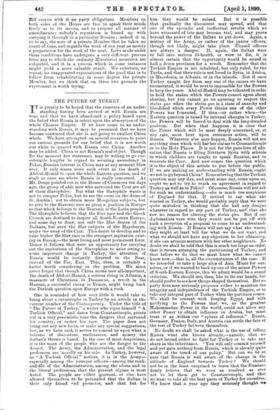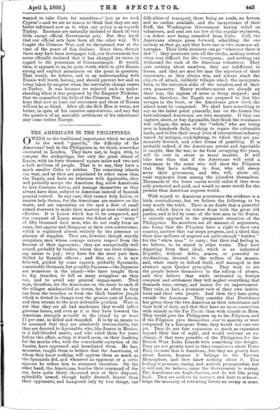THE FUTURE OF TURKEY.
TT is greatly to be hoped that the rumours of an under- standing having been arrived at with Russia are true, and that we have abandoned a policy based upon the belief that Russia is intent upon the absorption of the whole Chinese Empire. If we have come to an under- standing with Russia, it may be presumed that we have become convinced that she is not going to swallow China whole. We have attempted on several occasions to point out various grounds for our belief that it is not worth our while to quarrel with Russia over China. Another may be added. China is not Russia's real object. Though for the moment her statesmen may be willing to go con- siderable lengths in regard to securing ascendency in Pekin, Russian interest in China may at any moment blow over. It only wants some such event as the death of Abd-ul.Hamid to open the whole Eastern question, and we shall at once see where Russia is really concerned. As Mr. Drage pointed out in the House of Commons ten days ago, the group of able men who surround the Czar are all of them Slavophiles. But what the Slavophile wants is not to conquer Pekin, but to see the cross on the dome of St. Sophia ; not to obtain more Mongolian subjects, but to give to the Slavonic race as great a position in Europe as that which belongs to the Teutonic or the Latin peoples. The Slavophile believes that the Slav race and the Greek Church are destined to inspire all South-Eastern Europe, and some day to draw, not only the Slav States of the Balkans, but even the Slav subjects of the Hapsburgs, under the sway of the Czar. This desire to develop and to raise higher the Slav race is the strongest aspiration exist- ing in Russia,—the most living and most permanent force. Hence it follows that were an opportunity for carrying out the aspirations of the Slavophiles to arise owing to some important change in Turkey, the attention of Russia would be instantly diverted to the Near, instead of the Far, East. This, then, is certainly a factor worth considering in the problem. We must never forget that though China seems now all-important, the death of Abd-ul-Hamid, a serious rising in Albania, a massacre of Christians in Damascus, a revolt in the Hauran, a successful rising in Yemen, might bring back the Turkish question upon Europe with a rush.
One is reminded of how very little it would take to bring about a catastrophe in Turkey by an article in the current number of the Contemporary. Under the title of "The Future of Turkey," a writer who signs himself "A Turkish Official," and dates from Constantinople, points out in a very pessimistic tone the dangers that surround his country, or rather his race. The paper does not bring out any new facts, or make any special suggestions, but., as we have said, it serves to remind us upon what a volcano of discontent, restlessness, and misery the Sultan's throne is based. In the case of most despotisms, it is the mass of the people who are the danger to the despot. The Army, the Administration, and the legal profession are usually on his side. In Turkey, however, as "A Turkish Official" notices, it is in the Army— especially among the younger officers—among the rank- and-file of the Administration, among the ulema and in the liberal professions, that the present regime is most bated. The people are either ignorant, or else have allowed themselves to be persuaded that the Sultan is their only friend e.nd protector, and that but for bin] they would be ruined. But it is possible that gradually the discontent may spread, and that one of the sporadic and ineffectual revolts which we have witnessed of late may become real, and may prove beyond the power of the Sultan to put down. Again, a mutiny of the Army, or rather of the junior officers, though not likely, might take place. Unpaid officers are always a danger. If, again, the Sultan were to fall into serious ill-health, or were to die, it is almost certain that the opportunity would be seized in half a dozen provinces for a revolt. Remember that the Turkish Empire is not inhabited, but only ruled, by the Turks, and that their rule is not loved in Syria, in Arabia, in Macedonia, in Albania, or in the islands. But if once Turkey caught fire from any one of the causes we have enumerated, it would be next to impossible for the Powers to keep the peace. Abd-ul-Hamid may be tolerated in order to hold the stakes which the Powers cannot agree about sharing, but you cannot go on agreeing to respect the status quo when the status quo is a state of anarchy and bloodshed which every Power thinks one of the other Powers has fomented. If then—or rather when—the Eastern question is raised by internal changes in Turkey, the Powers will be forced to deal with the long-dreaded problem. But when that happens it is clear that the Power which will be most deeply concerned, or, at any rate, most bent upon strenuous action, will be Russia. Whatever else may happen, Russia will not see anything done which will barber claims to Constantinople or to the Holy Places. It is not for the pure love of edu- cation that Russia is filling Northern Syria with schools in which children are taught to speak Russian, and to venerate the Czar. And now comes the question which it is the object of this article to put before the public. If we are making an understanding with Russia, ought we not to go beyond China? Remembering that the Turkish question may any day, and must some day, come upon us, ought we not to. try to reach an agreement- in regard to Turkey as well as to Pekin? Of course, Russia will not ask for such an understanding,—she is much too suspicious of England for that. If invited to say what she wanted in Turkey, she would probably reply that we were quite mistaken in thinking that she bad any designs whatever in regard to any part of Turkey, and that she saw no reason for altering the status quo. But if our diplomatists were wise they would not be put off with such a reception of a proposal to come to an understand- ing with Russia. If Russia will not say what she wants, they might at least tell her what we do not want, and what we should not have any objection to her obtaining, if she can arrange matters with her other neighbours. No doubt we shall be told that this is much too large an order, that it means arranging the partitioning of Turkey, and that before we do that we must know what we canner. know now,—that is, all the circumstances of the case. If we intended to take a large slice of Asia Minor for our. selves, or if we wanted to back up one of the minor Powers of South-Eastern Europe, this we admit would be a sound criticism. We should not, then, like to tie our hands, but should prefer to see how things shaped themselves. But no party here now seriously proposes either to maintain the integrity and independence of the Turkish Empire, or to take any integral part of Turkey when the partition comes. We shall be content with keeping Egypt, and with notifying to the Powers that we, as the greatest Mahommedan Power in the world, could not allow any other Power to obtain influence in Arabia, but must treat it as within our " sphere of influence." Russia, Germany, France, Italy. and Austria can settle the fate of the rest of Turkey between themselves.
No doubt we shall be asked what is the use of telling Russia what she knows already,—namely, that we do not intend either to fight for Turkey or to take any share in the inheritance. You will only commit yourself and yet gain nothing from Russia, which is already quite aware of the trend of our policy.' But can we be so sure that Russia is well aware of the change in the attitude of England towards Turkey ? We should not be in the least surprised to learn that the Russians firmly believe that we were as resolved as ever not to let them get to Constantinople, and that we want to take all the best parts of Turkey for ourselves. We know that a year ago they seriously thought we, wanted to take Crete for ourselves—' just as we took Cyprus'—and we see no reason to think that they are any better informed now as to what our policy is as regards Tiirkey. Russians are naturally inclined to think of very little except official Government acts. But they know that our official acts have been all the other way. We fought the Crimean War, and we threatened war at the time of the peace of San Stefano. Since then, though there may have been newspaper talk, our Government has never officially declared that it has changed its views in regard to the possession of Constantinople. It would, then, it appears to us, be quite worth while to give Russia strong and explicit assurances on the point in question. That would, we believe, end in an understanding with Russia well worth baying, and should prevent her and us being taken by surprise when the inevitable change comes in Turkey. It was because we rejected such an under- standing when it was proposed by the Emperor Nicholas, that we committed the folly of the Crimean War. Let us hope that now at least our statesmen and those of Russia will not be so blind. After all, the Sick Man is worse, not better, in spite of his curative amputations, and any day the question of an amicable settlement of his inheritance may come before Europe.







































 Previous page
Previous page